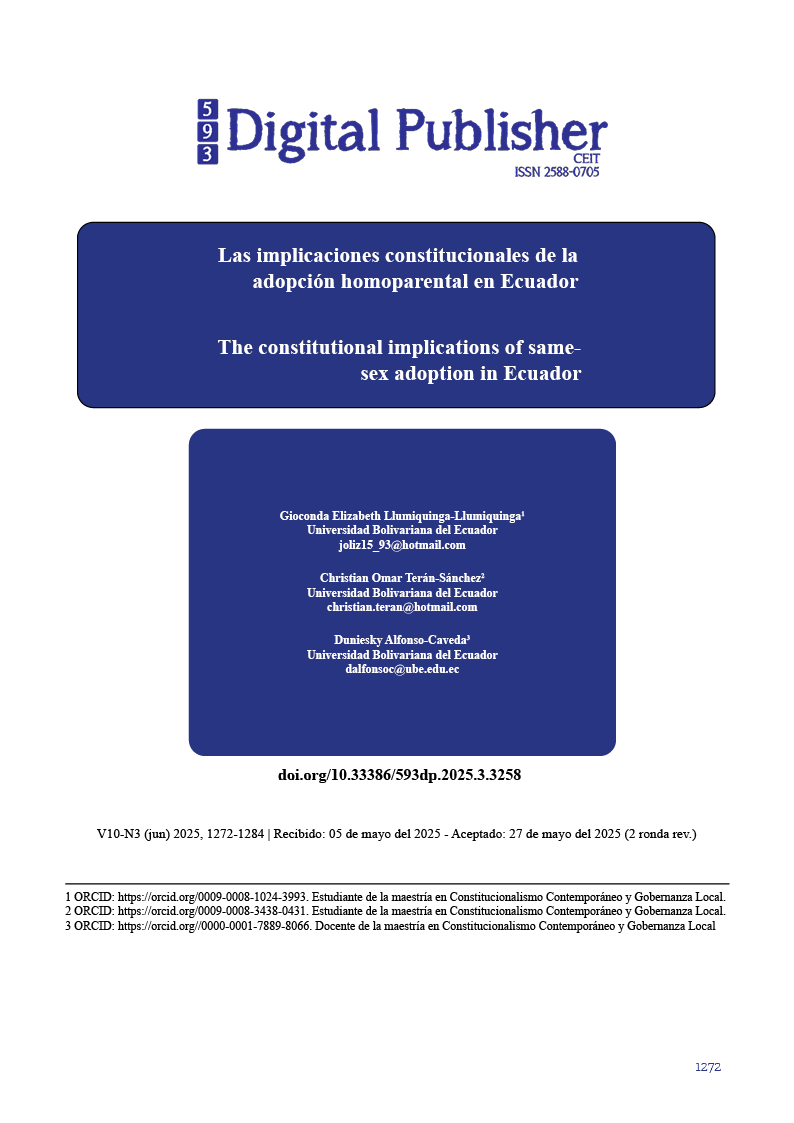The constitutional implications of same-sex adoption in Ecuador
Main Article Content
Abstract
The development of this article focuses on establishing how homosexual (gay) collectives and their rights have been left behind in one way or another in society. The primary objective of this article is to analyze the constitutional implications that prohibit adoption by same-sex couples in Ecuador, in Article 68 of the Constitution of the Republic of Ecuador, because on the one hand we observe that it guarantees the formation of a family in its various types and on the other hand in the same article limits this right in adoption issues, preventing homoparental adoption. This study allows us to analyze the national restrictions vs. the permissibility of international regulations focused on human rights. For this, a detailed legal analysis will be used, using effective research methods, which will help to determine the application of constitutional principles such as the best interest of the child and more principles and rights of the human being. In this sense, what leads us to conclude the present investigation is that the constitutional restrictions generate contradictions in the Ecuadorian legal system, requiring an immediate revision of the regulations, guaranteeing all couples, including same-sex couples, to have children through the adoption system.
Downloads
Article Details

This work is licensed under a Creative Commons Attribution-NonCommercial-ShareAlike 4.0 International License.
1. Derechos de autor
Las obras que se publican en 593 Digital Publisher CEIT están sujetas a los siguientes términos:
1.1. 593 Digital Publisher CEIT, conserva los derechos patrimoniales (copyright) de las obras publicadas, favorece y permite la reutilización de las mismas bajo la licencia Licencia Creative Commons 4.0 de Reconocimiento-NoComercial-CompartirIgual 4.0, por lo cual se pueden copiar, usar, difundir, transmitir y exponer públicamente, siempre que:
1.1.a. Se cite la autoría y fuente original de su publicación (revista, editorial, URL).
1.1.b. No se usen para fines comerciales u onerosos.
1.1.c. Se mencione la existencia y especificaciones de esta licencia de uso.
References
Asamblea Nacional. (2003). Códiog de Niñez y Adolescencia. Lexis. Obtenido de https://www.lexis.com.ec/biblioteca/codigo-ninez-adolescencia
Asamblea Nacional. (2008). Constitución de la República del Ecuador. (Lexis, Ed.) Obtenido de https://www.lexis.com.ec/biblioteca/constitucion-republica-ecuador
Barros, J. (2022). La adopción homoparental en el Ecuador como institución jurídica. Sus retos, marco legal y la protección de los Derechos. Editorial EBOOKS. Obtenido de https://www.google.com.ec/books/edition/La_adopci%C3%B3n_homoparental_en_el_Ecuador/yl56EAAAQBAJ?hl=es&gbpv=0
Benchuya, M., & Vito, H. (2005). Adopción para padres e hijos. ALBATROS SACI. Obtenido de https://www.google.com.ec/books/edition/Adopcion_Para_Padres_E_Hijos/nzauZ-6fe3oC?hl=es&gbpv=1&dq=que+es+la+adopci%C3%B3n+en+derecho&printsec=frontcover
Corte Interamericana de Derechos Humanos. (24 de noviembre de 2017). Corte Interamericana de Derechos Humanos. Obtenido de https://www.corteidh.or.cr/docs/opiniones/seriea_24_esp.pdf
Malla, F., & Vásquez, J. (2021). La adopción homoparental en el Ecuador. FIPCAEC, 6(1), 557-582. doi:https://doi.org/10.23857/fipcaec.v6i1.355
Naciones Unidas. (20 de noviembre de 1989). Naciones Unidas org. Obtenido de https://www.ohchr.org/es/instruments-mechanisms/instruments/convention-rights-child
Organización del las Naciones Unidas. (10 de Diciembre de 1948). Declaración Universal de Derechos Humanos. Obtenido de Organización de Naciones Unidas: https://www.un.org/es/about-us/universal-declaration-of-human-rights
Paspuel, L. (01 de octubre de 2019). La adopción homoparental: Consideraciones para el reconocimiento constitucional en el Ecuador del 2019 . Obtenido de Repositorio Digital de la Universidad Simón Bolívar: https://repositorio.uasb.edu.ec/bitstream/10644/7237/1/T3131-MDE-Paspuel-La%20adopcion.pdf
Quintuña, E., & Estrada, E. (2024). La adopción frente al interés superior de los niños/as y adolescentes en Ecuador. Imaginario Social, 7(4), 22. doi:10.59155/is.v7i4.242
Rodríguez, E. (2003). Metodología de la investigación. Universidad Juárez Autónoma de Tabasco. Obtenido de https://www.google.com.ec/books/edition/Metodolog%C3%ADa_de_la_Investigaci%C3%B3n/r4yrEW9Jhe0C?hl=es&gbpv=1&dq=m%C3%A9todo+de+investigacion+anal%C3%ADtico&pg=PA30&printsec=frontcover
Velíz, Y. (2019). Perspectivas de la adopción homoparental en el Ecuador. Iustitia Socialis. Revista Arbitrada de Ciencias Jurídicas, 4(1), 16. doi:10.35381/racji.v4i1.547




